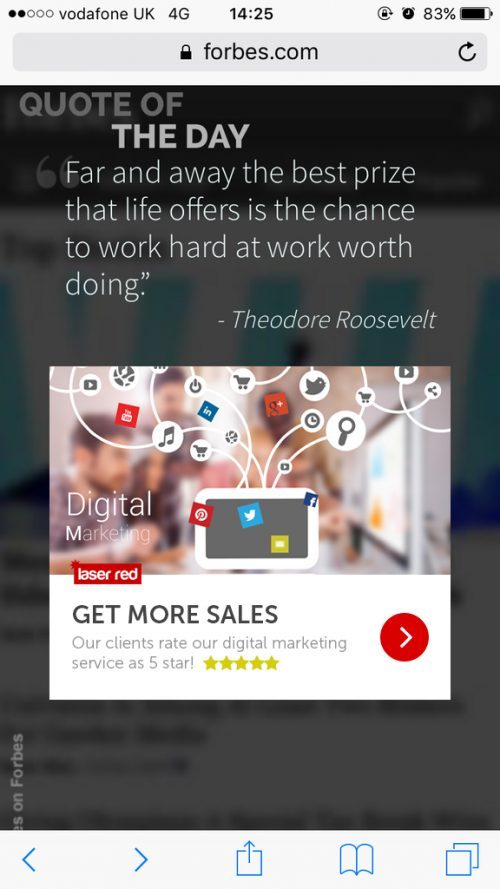Back in August last year, Google announced they will punish any mobile web page that uses full screen or pop-up ads. As of the 10th January, this new algorithm has gone live. So if your website has intrusive pop-up ads, your search engine ranking will decrease.
With the recent launch of mobile-first indexing, and now penalising ads when visiting sites on mobile devices, what will be next? We constantly have our marketing ears to the ground, so you don’t have to!
How is this going to affect me?
Well for starters, it makes browsing on your mobile a much nicer experience! And we all know Google loves a good user experience. The ban on intrusive pop-up and standalone ads means that content on the webpage is not hidden from view.
However, from a business point of view this could be detrimental to getting your key message out there. Your search ranking will decrease if you have a full page pop-up encouraging email sign ups on your homepage. Instead, you will have to make this a small banner at the top of your page (ensuring no content is hidden). Do remember though, that this only affects ranking of sites viewed on mobile devices. Not that we would recommend a full page pop-up when viewing your site on a desktop!
Does this mean our cookie pop-up needs to be removed?
In short, no. There is a list of a few techniques that Google has stated will not be affected by this change:
- Pop-ups that are linked to a legal obligation, for example cookie usage.
- Login pop-ups as these are not indexed.
- Banners that do not take up too much screen space (must be easily dismissable too).
Although this information indicates the use of banners will not affect your search rankings, the allowed size is yet to be specified.
So are mobile ads out of the question?
If a web page is hidden behind an ad, then yes. The message Google are trying to push here is that user experience should not be interrupted. If you are on a website, you should be able to easily and quickly find the relevant information. You shouldn’t have to interact with an ad before you get to the page. Let’s take a look at Forbes.

Before you read one of their articles, you are sent to an inbetween page with an ad. Yes the ad does take up a lot of space, but it is only displayed for 5 seconds and then you are automatically directed to the web page.
Worried your mobile adverts may affect your rankings?
Our search engine optimisation experts are always on hand to go through this in more detail with you. Please contact us on 01472 878 496 or drop us an email office@laserred.co